Why Is My Dog Suddenly Sleeping on the Floor?
Dog owners have probably noticed that their furry friends sleep most of their lives. Adult dogs, on average, sleep 10-12 hours a day, and puppies and senior dogs can sleep up to 20 hours a day!
Like humans, dogs need quality sleep to stay healthy. Sleep helps dogs’ immune systems, memory, and brain development. They also need sleep to heal from injuries and illnesses.

When dogs don’t get enough sleep, they are prone to many adverse conditions. Lack of sleep can put dogs in a bad mood like it does humans.
With sleep such a significant part of their lives, we try to do everything we can to make it a peaceful and enjoyable experience for them.
Some dog owners let their dogs sleep in the bed with them. Others set up crates and houses with plush dog beds. And some dog owners give their pups the run of the house, letting them choose wherever they want to sleep.
Yet with all the accommodations we give them, it’s not uncommon to see your dog sprawled out and sleeping on a hard, uncomfortable floor. If your dog started sleeping on the floor recently, you might wonder, why is my dog suddenly sleeping on the floor?
9 Reasons Why Your Dog Suddenly Started Sleeping on the Floor
If your dog suddenly started sleeping on the floor, it’s probably not a reason to worry. But in some cases, it may be worth monitoring or checking in with your veterinarian. It is also important to note where your dog was sleeping before it moved to the floor.
Here are some common reasons why your dog may have suddenly started sleeping on the floor.
1. It’s Hot
Plush dog beds support your dog’s joints and are great for cool weather. The soft fabric stays warm with your dog’s body heat and makes a cozy and comfortable little nest. Many owners line the dog bed with blankets and towels for additional warmth and comfort.
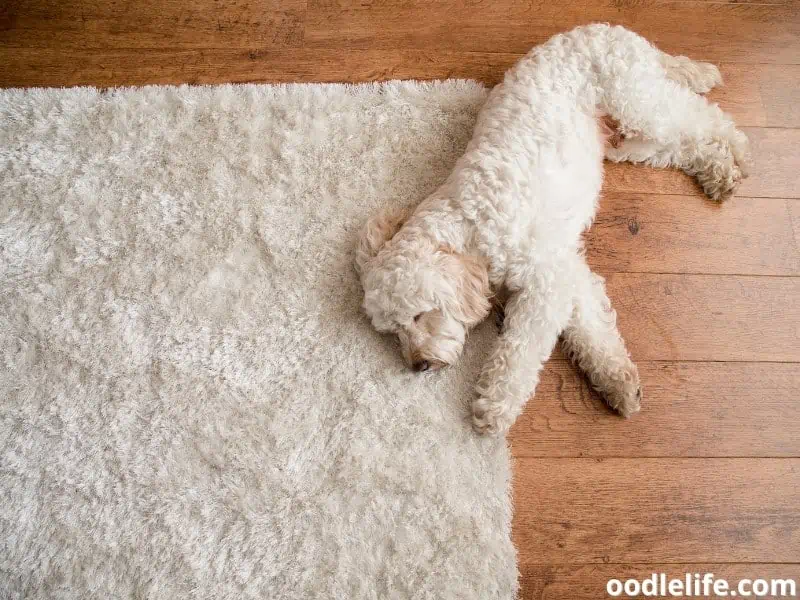
However, your dog may be getting too hot in the dog bed. During the warmer months, your dog might elect to sleep on the floor where it’s cooler.
Heat rises, so the floor is often the coolest place in the room. Dogs can strategically lie on the floor to maximize the amount of skin touching the floor. Lying on the floor allows them to shed body heat and cool off.
If your house is hot and you notice your dog suddenly sleeping on the floor, this is likely the reason.
Dogs who sleep on the floor to cool off might sleep in the Superman position with their front legs kicked out in front of their head and their rear legs extended behind the buttocks.
2. The Bed Is Too Small
Your dog might start suddenly sleeping on the floor if it finds its bed too small. If your adult dog still uses its puppy bed, it might have outgrown it. Your dog may not like the feeling of being constricted in the space of a small bed.

Your dog needs a bed big enough to stretch out and relax. Large dogs will need bigger beds than small dogs. If you suspect the bed is too small, introduce a bigger bed and see if your dog resumes sleeping in it instead of on the floor.
3. The Bed Is Uncomfortable or Damaged
Another reason your dog might start sleeping on the floor is if its bed is damaged or worn out from overuse. Is the bed old and starting to disintegrate? Check your dog’s bed to see if the filling is escaping from the fabric or the seams are coming undone.
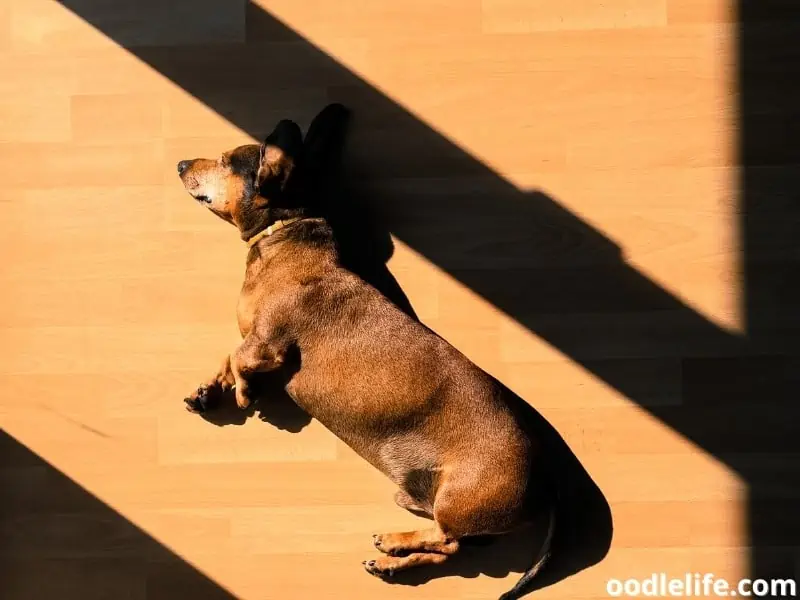
It’s also possible there is a foreign object in the bed bothering your dog. Check if your dog carried something into the bed, like a rock or stick that could be pressing into its skin.
4. Your Dog Wants To Be Near You
If your dog’s bed is in another room or away from you, your dog might feel lonely. Many dogs like to lie on the floor near their owner’s bed (or in their owner’s bed) to be close to them.
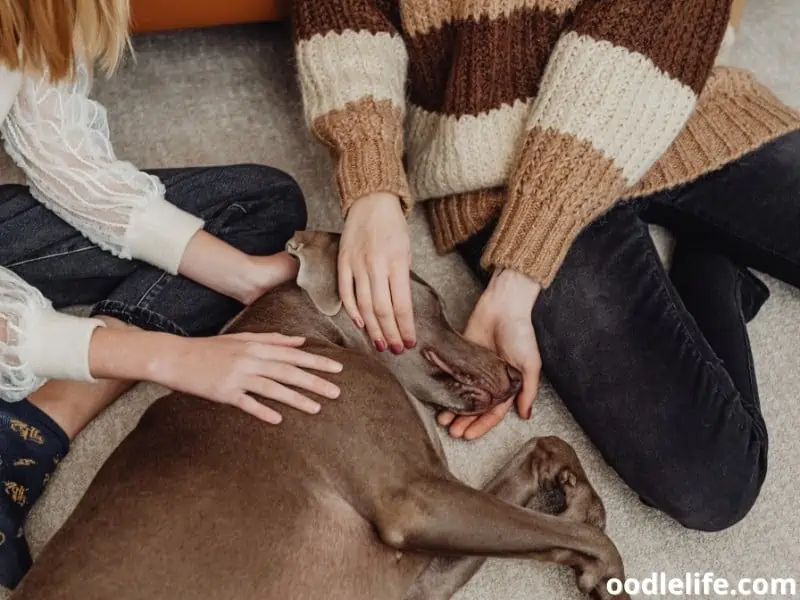
If your dog suddenly starts sleeping on the floor, consider whether it might be having some separation anxiety. Have you started leaving your dog alone for extended periods? Has your dog been in daycare or at a kennel?
5. Your Dog Experiences Restlessness
Dogs sometimes have difficulty getting comfortable. You may have seen your pup spin in circles multiple times before lying down or repeatedly changing positions. It could be restless if your dog suddenly starts sleeping on the floor.

Many different things can cause restlessness in dogs. Your dog might not be getting the exercise it needs. Or perhaps your dog has recently experienced new and stressful environments that led to anxiety.
6. Your Dog’s Preferences Changed
Dogs do strange things sometimes that have no explanation. Their quirky, seemingly-random silly behaviors are part of why we love them. I can’t help but laugh when my dog decides to walk into the middle of a room and sit just there for no reason.

If your dog suddenly starts sleeping on the floor instead of its bed (or wherever it used to sleep), it may be a matter of preference. Like with humans, dog preferences can change over time. Perhaps your dog decided it likes to sleep on the floor or finds it oddly comforting.
If your dog seems happy and comfortable on the floor, it should not be a cause for alarm.
7. The Bed Is Too High
Does your dog need to climb to get into its bed? If so, the bed might be too high for it. This can be a problem for older dogs that are not as agile as they used to be.
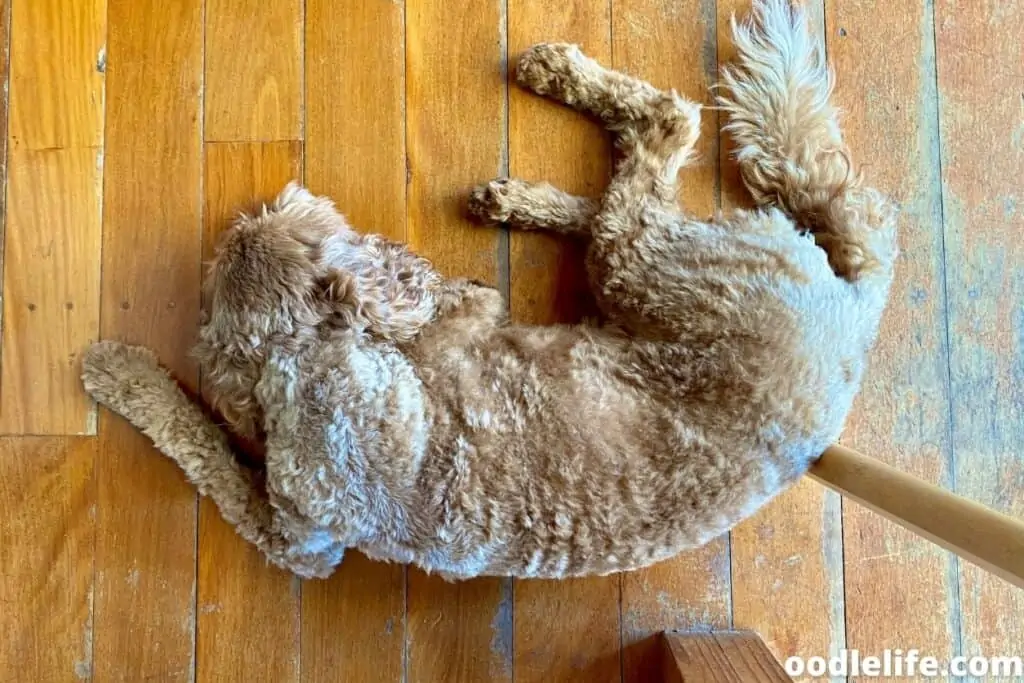
If your older dog suddenly starts sleeping on the floor, check to ensure it’s not a problem with access to the bed.
8. Your Dog Sustained an Injury
Dogs with injuries might start suddenly sleeping on the floor if they are in pain. Dogs can suffer from orthopedic issues like spinal and muscular pain, disc disease, and hip dysplasia. These dogs might be trying to find a firm surface that provides more support than a soft bed.

If you notice your dog has abandoned its bed for the floor and is also displaying other symptoms indicative of pain – like moaning, crying, whimpering, panting, spinning in circles, and looking generally uncomfortable – you should contact your veterinarian for an appointment.
9. Canine Cognitive Dysfunction
Canine Cognitive Dysfunction is like Alzheimer’s in people. Older dogs can experience cognitive decline. They get restless and confused at nighttime and may have trouble sleeping or change their sleep habits.

If you have an older dog that recently started sleeping on the floor and is also displaying cognitive symptoms like confusion, you should contact your vet.
Frequently Asked Questions
Do you still have concerns about your dog’s sleeping habits? Here are some answers to the most frequently asked questions.
Should I let my dog sleep on the floor?
Like humans, dogs need good sleep to be healthy. The most crucial factor is that your dog is sleeping. If your pup is snoozing away peacefully on the floor, it is not a cause for concern.

However, if your pup seems uncomfortable on the floor, there may be an underlying medical issue or pain.
Senior dogs need supportive beds, so the floor is not the best option. As dogs age, they become susceptible to joint issues, arthritis, and hip dysplasia. These dogs would do best in an orthopedic, memory-foam type of mattress.
Why does my dog adjust where he sleeps?
There are various reasons why your dog may switch up where he decides to sleep. The most common reason dogs sleep in a new spot is an injury or illness. A dog that once slept on a wood floor may find a carpet or cushioned surface more comforting when feeling sick or sore.
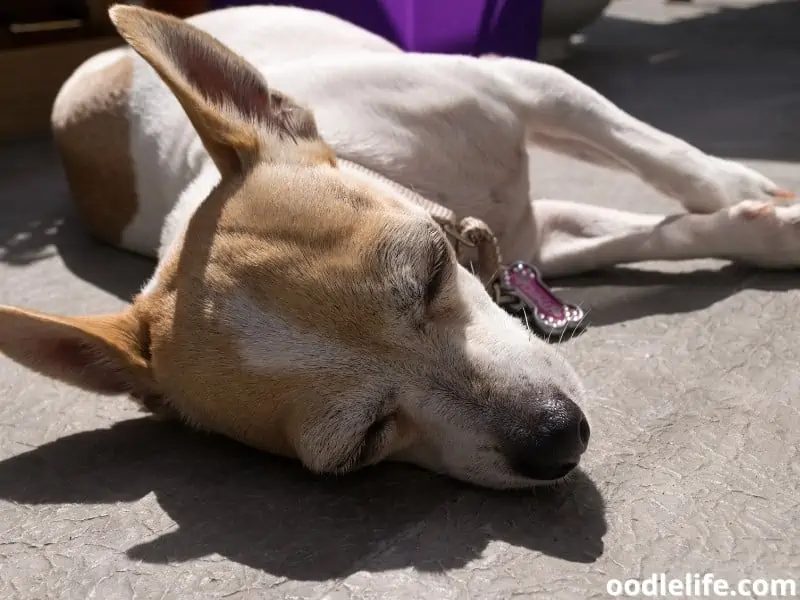
Final Thoughts
So, why is my dog suddenly sleeping on the floor? Dogs can be creatures of habit, adopting the same daily routine and sleep behaviors. However, if your dog suddenly starts sleeping on the floor instead of its bed – or wherever it was sleeping before – it is not a cause for alarm.
Your dog may be too hot, uncomfortable in bed, trying to get closer to you, or restless. Check to make sure that your dog has not outgrown its bed. You may be unable to pinpoint an exact reason for the behavior – your dog may just enjoy sleeping on the floor!
It may take some troubleshooting to determine why your dog suddenly started sleeping on the floor. If your dog previously slept in a dog bed but lost interest, it might be time to upgrade the bed.
If your dog seems happy on the floor and is not exhibiting other worrisome symptoms like pain, it’s fine to let them be in the short term.
In the long term, sleeping on the floor is not a supportive position for dogs. Older dogs are prone to orthopedic issues and need a comfortable, supportive bed for their joints and muscles.